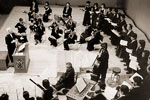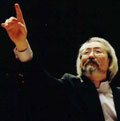|
|
|
[INDEX]
Great expectations are rarely met. Despite high hopes generated by their
fine CDs -- including some twenty volumes of a projected complete Bach
series on the Swedish BIS label -- the Bach Collegium Japan sounded drab
and listless in their Carnegie Hall debut on April 8, 2003.
 The
Collegium, founded in 1990 by Masaaki Suzuki, is an oddity -- perhaps
the only Asian early music group to break into Western consciousness.
Culture and entertainment journalists love anything that seems to dissolve
the barriers between societies and traditions. The Collegium's award-winning
recordings of Bach cantatas and masses have impressed the West for over
a decade and seemed to prove that music is international and that national
styles can be comprehended and performed even by strangers to the tradition. The
Collegium, founded in 1990 by Masaaki Suzuki, is an oddity -- perhaps
the only Asian early music group to break into Western consciousness.
Culture and entertainment journalists love anything that seems to dissolve
the barriers between societies and traditions. The Collegium's award-winning
recordings of Bach cantatas and masses have impressed the West for over
a decade and seemed to prove that music is international and that national
styles can be comprehended and performed even by strangers to the tradition.
Yet, as is often the case in this age of digital recording, what we heard
on CD did not match the live performance.
For their Carnegie Hall traversal of Bach’s St. Matthew Passion, the
Collegium used the same balance of Japanese and Western singers as it
does on disc. The chorus and orchestra were all-Japanese, while the soloists
were mostly European.
The mixed 23-member chorus sang the German text with remarkably accurate
diction, pure tone, and fine choral musicality. The 30-member orchestra
played dutifully but timidly, as if afraid to take risks and make a statement.
Such modesty is fatal in the current field of Baroque music performance,
where every group and conductor boasts a distinct style. The blame for
this blandness must lie with the group’s 49-year old conductor and music
director Masaaki Suzuki (photo below left).
 The
Collegium lacked the animating spirit, the exalted crudeness, the robust
primitivism that characterizes the best Western, historically informed
interpretations of Bach’s work. They seemed to have a general idea of
Bach that resembled a clever copy of a genuine old master. Imitation is
the sincerest form of flattery, but we expect world-class musicians to
“make it new." Knock-offs might satisfy the masses, but New York's
early music fans are finicky. They hear the world’s best musicians on
a daily basis. Standards are high. The
Collegium lacked the animating spirit, the exalted crudeness, the robust
primitivism that characterizes the best Western, historically informed
interpretations of Bach’s work. They seemed to have a general idea of
Bach that resembled a clever copy of a genuine old master. Imitation is
the sincerest form of flattery, but we expect world-class musicians to
“make it new." Knock-offs might satisfy the masses, but New York's
early music fans are finicky. They hear the world’s best musicians on
a daily basis. Standards are high.
The vocal soloists were uneven. German tenor Gerd Türk was a serviceable
Evangelist, Dutch bass Peter Kooij was a rather dull Jesus, Jochen Kupfer
an adequate Judas and Pilate. British countertenor Robin Blaze stood out
for his brilliant sweet tone and smooth, clear high notes. Japanese tenor
Makoto Sakurada had just one aria (“O Schmerz!”) but displayed a clear
natural high voice with good diction. Japanese soprano Yukari Nonoshita,
on the other hand, seemed unfamiliar with Bach’s style, substance and
text in “Wiewohl mein Herz” and “Ich will dir mein Herze schenken”.
Attendance was meagre, due to the weak economy and possibly due to fear
of all things Asian in the wake of SARS. Oddly, there were almost no Japanese
in the audience. I left at intermission.
Reviews of the Bach Collegium Japan’s American tour were mixed. The positive
reviews from the Los Angeles Times, LA Weekly, and Boston Globe focused
on the spiritual balm of Bach’s music in a time of war. The San Francisco
Chronicle found the playing dullish, lax, and unremarkable. The New York
Times seemed generally content but complained of oboes briefly out of
tune.
> Carnegie Hall
> Bach Collegium Japan
[INDEX]

|
|
|


